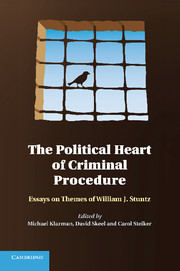Book contents
- Frontmatter
- Contents
- Contributor List
- Introduction: Appreciating Bill Stuntz
- Part I The Political Economy of Substantive Criminal Law
- Part II Police Investigations
- Part III Emotion, Discretion, and the Judicial Role
- 9 Two Conceptions of Two Conceptions of Emotion in Criminal Law: An Essay Inspired by Bill Stuntz
- 10 Patrolling the Fenceline: How the Court Only Sometimes Cares about Preserving Its Role in Criminal Cases
- 11 Three Puzzles in the Work of Bill Stuntz
- 12 The Mercy Seat: Discretion, Justice, and Mercy in the American Criminal Justice System
- 13 Epilogue: Three Underrated Explanations for the Punitive Turn
- Index
- References
12 - The Mercy Seat: Discretion, Justice, and Mercy in the American Criminal Justice System
Published online by Cambridge University Press: 05 March 2012
- Frontmatter
- Contents
- Contributor List
- Introduction: Appreciating Bill Stuntz
- Part I The Political Economy of Substantive Criminal Law
- Part II Police Investigations
- Part III Emotion, Discretion, and the Judicial Role
- 9 Two Conceptions of Two Conceptions of Emotion in Criminal Law: An Essay Inspired by Bill Stuntz
- 10 Patrolling the Fenceline: How the Court Only Sometimes Cares about Preserving Its Role in Criminal Cases
- 11 Three Puzzles in the Work of Bill Stuntz
- 12 The Mercy Seat: Discretion, Justice, and Mercy in the American Criminal Justice System
- 13 Epilogue: Three Underrated Explanations for the Punitive Turn
- Index
- References
Summary
It is a signal honor to succeed Bill Stuntz as the Henry J. Friendly Professor of Law at Harvard. To hold a Chair named for such a respected judge and held by such a respected scholar and beloved colleague and friend is not only an honor but also an inspiration – to hone my own craft, to think harder, and to reach farther, both professionally and personally.
Stuntz and Friendly were both brilliant and principled in their respective legal domains, but I’m sure I was not the only one to joke with Bill that he was more “friendly” than his Chair's namesake, who was known to be rather intimidating. My topics for this chapter – mercy and justice, in Bill Stuntz's work and my own – may lead some to a similarly amused bemusement, in that my approach to this topic is more explicitly religious in inspiration than Bill's own, despite the fact that he was a devout Christian and I am an (at most) agnostic Jew. Perhaps it was Bill's unconscious influence, or perhaps it was my very agnosticism that liberated me to explore theology as a source of public values, but it was I (and not Bill) who gave a keynote address at a Chicago Divinity School conference, on “Doing Justice to Mercy,” and who later co-taught a course with a Harvard Divinity School professor on “Justice and Mercy in the Jewish and Christian Traditions and American Criminal Justice.” In what follows, I hope to show that the theological origin of the concept of mercy offers both a contrast to and a path toward a human-scaled practice of mercy – a practice informed by and sympathetic to Bill's own criminal justice scholarship and Christian commitments.
- Type
- Chapter
- Information
- The Political Heart of Criminal ProcedureEssays on Themes of William J. Stuntz, pp. 212 - 227Publisher: Cambridge University PressPrint publication year: 2011
References
- 1
- Cited by

